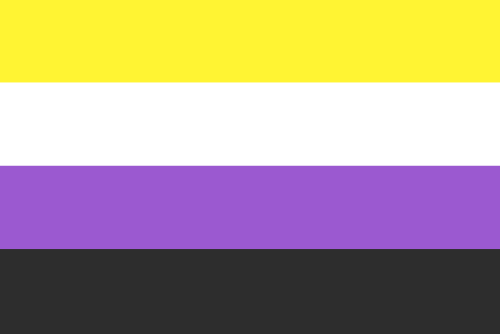When I was a young child, I thought my parents wanted me to be a girl so badly that they secretly surgically altered my body so I’d be a girl (i.e. have a vulva). I never brought it up with my parents, I just frustratingly accepted it. I was taught gender and sex were synonymous, and that I am female, even if my body was an artificial one.
I left it at that for most of my life, and as I grew up I realized that scenario was highly unlikely (my dad wanted a boy, after all). When we were given sex-ed in high school, sexuality and gender identity was brushed over quickly, taught for a dyadic and binary audience. When we are not given the option or knowledge or freedom to explore our gender identity, how are we to know if what we are is not an arbitrary assignment based on nothing but a doctor’s assessment of our genitals at birth? While I didn’t exactly feel like a girl growing up, from what I knew about the gender binary, I knew I wasn’t a boy, either, or at least not completely. So I stuck with what was familiar, no biggie.
While some people may have known their gender since the moment they recognized their own identity as an individual, others can’t realize because they aren’t given the option of something else until late adulthood. When I found out about nonbinary genders around two years ago, I didn’t understand them at first. Gender as a spectrum? No gender? Multiple genders? It seemed like a minefield. Even though I’m confident in my gender identity now, there are still days where it looks like a navigational nightmare.
Just like with compulsory heterosexuality, most people in our cisnormative society argue that if a person never questioned their gender, then they’re probably cis. The idea that cis is default, and one isn’t trans or gender variant unless it’s constantly on their mind is harmful to and debilitates individuals, and as a result, entire LGBTQIA2+ communities.
So, I suggest everyone to ask themselves the questions I’ve asked myself:
- Am I happy with my assigned gender?
- What if I were assigned a different gender?
- What if I weren’t assigned a gender?
- Which parts of whom I am makes up my gender?
- Do I want to be this gender?
Some of these questions might be difficult to answer. Sometimes it’s just a feeling that’s difficult to explain. And if after exploring your gender identity, you find you’re cis, then excellent! You’ll know yourself better by analyzing parts of your person and being confident in the identity you claim.
I happened to find that I was not exactly happy with my assigned gender. And something happens when you realize who you are, and realize others don’t see you the way you see yourself. That’s when you start thinking about coming out; sharing with the world, or a slice of the world, who you are. I was lucky that the slice I’ve chosen to share it with were accepting enough of it.
So here are a handful of things I’m thankful for in my coming out process, and I’m sure others will be in their own coming out process.
Respect
Throughout the process, there will be questions. Ranging from “what pronouns do you use?” to “is this just a phase?” and the inevitable “aren’t ‘they’ plural?” I’m lucky enough that I didn’t have to deal with the more aggressive variations.
Relationship Maintenance
I’ve been fortunate to not have lost any friendships after coming out. Sometimes it’s difficult to accept the friend you had is no longer the person they used to be, or the person you thought they were, especially if they choose to transition.
Support
Perceived gender plays a large part in social dysphoria for trans and gender variant folks. Sometimes, it gets difficult when people get my pronouns wrong, or when people stubbornly refuse to use gender neutral language. While I’ve accepted that, for the meanwhile, gender variance is not widespread knowledge, it helps to have a safe space to be able to just be.
Acceptance
Coming out was exciting and a bit nerve wracking, each and every time, and almost every person I came out to had not heard of nonbinary genders until my introduction to them. Sometimes it was difficult to explain, and I could tell that some didn’t really understand the concept. However, they were all accepting, all willing to learn and put in the effort to adjust to my new identity.
And the chance to write for The Talon and share my ongoing experience. Thank you.
This article was submitted in response to The Talon’s call for submissions related to the Pride Collective’s Outweek.




